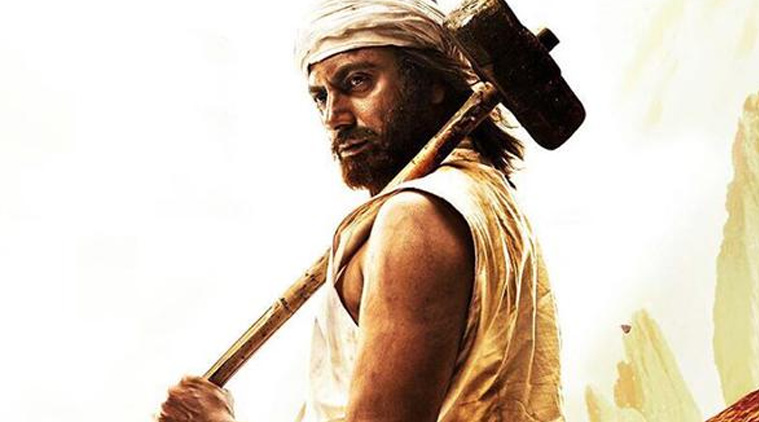It is a shame that the prints of Manjhi – The Mountain man were leaked much before the theatre release of the film. One may argue that with rising costs of theatre tickets, pirated versions are the only option. But the least they could do is to wait for the release date to come. It takes a lot of hard work and heart burn to make a film like Manjhi. And somewhere this leak has humiliated years of labour. Manjhi is not a movie with a humongous budget. Today as the industry is trying to make a niche for Indie and small budget films; it is a shame that we do not have any laws to protect films like Manjhi.
When you know that the maker of Mirch Masala and Bhavni Bhavai is coming back with a new film, expectations are bound to sky rocket. And then you also have Anjum Rajabali associated with the project. Manjhi’s compelling cast and crew had taken the film to the next level even before its release.
I would bypass the plot details (as the leaks have already done enough damage to the film). Ketan Mehta effortlessly interconnects the social commentary with the story of Dashrath Manjhi. What makes Manjhi a more than a ‘one time watch’ is the way it tugs at your heartstrings. This author came out of the theatre with a feeling of guilt gnawing severely.
Even before Manjhi’s struggle starts, the writers take us to another world. And it is not underdeveloped or rotten because they take us back in time. The rot still exists. It is the darker sides of the nation that we conveniently hide . That bonded labour still exists; that untouchability still exists; is reason enough to hang our heads in shame. One might argue that every nation has a dark past and present. But that is not even the point. The point is only we can better the state of our nation. What is the use of celebrating Indian origin CEOs taking the global stage by storm, or an Indian author grabbing an international prize if in some corner of the nation a man is still denied entry into a place of worship?
Timangshu Dhulia plays the role of the nasty upper caste Zamindar pretty well. The only problem is the duo of Dhulia and Pankaj Tripathi remind you too much of Gangs of Wasseypur.
Manjhi’s wife Phaguniya, played by Radhika Apte is probably the weakest link in the film. She looks too perfect for a remote village belle (and that too pretty poor) of the 50’s. The song and dance sequences make it filmy and it would have been really perfect if these were not used at all. Manjhi is that kind of a film that would do great without any Bollywood tadka at all.
The filming Phaguniya’s death is a soul stirring moment. It takes a minute to remind us of the privileged lives many of us lead. The time lapse and the string of events, Indira Gandhi’s election rally, famine, emergency and the rot in bureaucracy are interestingly woven into the screenplay.
Continued on next page
The film takes off to a different level after Phaguniya dies. Dashrath Manjhi, his clothes soaked in his wife’s blood stares at the towering mountain, challenging it that he will break it down to rubble. The monologue and Nawaz’s possessed expression would surely give goose bumps. Even though all of us know the real Dashrath Manjhi’s story, when Nawaz stands in front of the mountain one wonders – ‘is this even possible?’ His relationship with the mountain and his fight against family, friends and bureaucracy can be a cure for film buffs whenever they are down. One viewing of the film and one will almost say out loud, ‘my problems and sorrow are nothing as compared to this man’s’.
I have been an ardent fan of Nawazuddin Siddiqui since he played Khan in Kahani. And it was after Miss Lovely that I was sure he is one of the more daring actors Bollywood has produced. Actually I would say it is unfair to even add the ‘Bollywood’ tag to Mr. Siddiqui. He is everything that Bollywood wasn’t for a very long time.
As you get involved with Manjhi’s mission of breaking the mountain down; somewhere imagery pops up. Nawazuddin Siddiqui has broken another mountain. The mountain of stereotyping the ‘hero’ in mainstream cinema! A man who isn’t fair skinned, has no steroid induced physique and isn’t adept at gyrating and gymnastic moves has put up a challenge. A challenge where the actor has to become much bigger that the hero or the superstar.
Nawaz and Manjhi are so inseparable that at one point of time you feel it is the character that has wholly usurped the actor. At one point of time when he is lost in the memories of his dead wife, and has exiled himself in the mountain, sings and dances in his in own world; he almost looks like a saint.
And if this time Nawazuddin Siddiqui still is limited to awards in – Best Supporting Actor category; it would a shame for mainstream Indian cinema.
It would be good to see the film do a round of international film festival circuits and grab a few awards.
We should take a moment to thank the makers of the film. For the thousands in this country who had no idea about who Dashrath Manjhi was; the film is indeed an eye opener. One wonders why the road he made is not a must visit spot for lovers. Taj Mahal is our heritage. But isn’t love also about giving and spreading joy? And what joy this lover has left for an entire generation of people.
P.S- I would request people to watch the film in the theatre. We make films reach the 300 cr club with essentially a plot or a character to remember. Manjhi deserves more than this genre of cinema.
